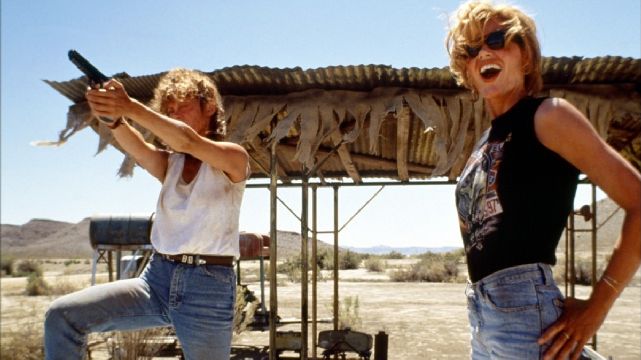Thelma & Louise (1991) 
“Somebody said get a life… so they did.”

Thelma & Louise (1991)
Director: Ridley Scott
Cast: Susan Sarandon, Geena Davis, Harvey Keitel
Synopsis: An Arkansas waitress and a housewife shoot a rapist and take off in a ’66 Thunderbird.
Watch this and other movies on Sky Cinema
There aren’t many people worthy of our admiration or sympathy in Ridley Scott’s Thelma & Louise, a movie which enjoys status as a paean to female empowerment but which really just demonstrates how women are as capable of making poor decisions as men. Geena Davis and Susan Sarandon (Robot & Frank, Arbitrage) play the eponymous characters, a couple of ordinary women who find themselves becoming fugitives from justice on a girl’s weekend away. Louise (Sarandon) is a waitress, although she seems too intelligent for such a job, and Thelma is a housewife who’s treated with chauvinistic intolerance by her husband (Christopher McDonald). When Louise finds an oily charmer (Timothy Carhart) preparing to rape her friend in the car park of some seedy bar at which they stop early on in their journey, she ends up shooting him through the heart. Panicked by the likelihood that the authorities are unlikely to believe they acted in self-defence (probably because they didn’t), the women go on the run.
The fact that most of the men in Thelma & Louise are low-lifes does little to help this movie, although the intention clearly is that their obnoxious behaviour should make it easier for us to side with a pair of women who do little to earn our respect but assume it simply because they represent the Female Victim of Male Cruelty (both physical and psychological). Hal (Harvey Keitel – Pulp Fiction, Inglourious Basterds, The Grand Budapest Hotel), the police officer co-ordinating the chase for the duo, is a decent enough chap, as is Jimmy (Michael Madsen – Reservoir Dogs), Louise’s sort-of boyfriend who nevertheless apparently provides the police with information regarding the girls whereabouts. But the other male characters are mostly comprised of that cowboy in the car park, a sexually aggressive truck driver, an abusive husband, a charming thief, and a macho cop whose bravado quickly crumbles when he finds himself on the wrong end of Thelma’s gun. He doesn’t really deserve to end up locked in the boot of his car in the middle of the desert and, whether we like it or not, murder and rape (or attempted rape to be precise) are not commensurate crimes, which kind of makes it difficult for us to entirely identify with the women and their plight for the rest of the movie. Had screenwriter Callie Khouri created a more balanced depiction of the male characters and not made Thelma such an empty headed bubble – she’s inviting a handsome stranger into their car about 24 hours after that attempted rape, something I imagine most women would find highly offensive had it been written by a man – the film would have been a great deal stronger.
Despite this, Thelma & Louise is watchable thanks to Ridley Scott’s typically professional work and strong performances from Sarandon and Davis. It’s Sarandon who’s called upon to carry more of the emotional burden than Davis, suggesting a dark episode in her past which makes it impossible for her to return to Texas which the script never fully explains, and she proves herself more than capable. It’s her performance, together with an early supporting role from Brad Pitt (Fight Club, World War Z), who oozes star charisma as a gentleman thief of the road, and some terrific desert cinematography by Adrian Biddle that provides the real reason for watching Thelma & Louise.
(Reviewed 26th December 2014)
httpv://www.youtube.com/watch?v=OXT3k4PTmSw

